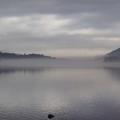News topics
Monthly Newsletters
// //// //// Online Booking //
// //// // // // // // //
For group bookings please contact
017687 77246 or
contact@derwentwater.org
Holme upon Spalding Moor Primary School, May 2019
March 2017
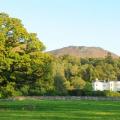
Lights, croissant, action! We have a bright new servery, with spotlights, shiny surfaces, and lots more room for juggling croissants.
It has been performing well so far, helped by our volunteer Mariana and some very well-organised groups. We hope you enjoy reading about some of these groups: the Edinburgh Musical Medics, Expedition Medicine, Arkholme Primary School, Sheffield Hallam University Environmental Science and Planning students, and All Saints Sheffield Sixth Form Geographers.
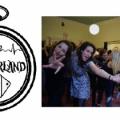
At the end of February 80 University of Edinburgh medical students spent an intensive weekend rehearsing their end of year musical at the hostel.
With the rain lashing down outside, the Musical Medics, with their full schedule of indoor activities, were the ideal group for a very wet weekend. Here is the producer, Abbey Wrathall, with a report of the weekend:
'Medics’ Musical is an annual performance by University of Edinburgh 5th Year Medical Students. It’s an original script, written by ourselves, with adaptations of well-known songs. We aim to be really inclusive, and there are over 100 people involved in this year’s show!
The Musical is such a tradition for medical students in Edinburgh, and part of it is a weekend of rehearsing and getting to know each other away from Edinburgh. This year Derwentwater Independent Hostel was a great option, a good distance from us and the chance to see more of the Lake District. Unfortunately it was a very soggy weekend, but we had a lot of fun anyway, including a great 3 course dinner and a quiz on Saturday evening. Thanks to everyone for helping to make it happen!'
We hope all goes well for finals - both the exams and the musical performances!
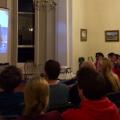
Extreme medicine, extreme cake baking, extreme amounts of coffee! The songs of the Edinburgh medics faded away to the sounds of mountain rescue sirens, and the dining room morphed from musical theatre to lecture theatre (thankfully no surgical theatres here yet!).
At the beginning of March we really enjoyed hosting another Expedition Medicine course, with about 70 medics working their way through an intensive schedule of lectures, team building activities, outdoor rescue scenarios, and endless flasks of coffee.
The course was very successful and we wish the participants all the best for future expeditions.
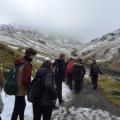
In the middle of March we had an excellent week, with two geography-related groups from Sheffield.
Sixth Form Geographers from All Saints School have been coming to the hostel for many years, studying the coastline at St Bees on their first day and walking the Helvellyn range on their second day, but it was the first visit for the Sheffield Hallam University Environmental Science and Planning department.
The university students stayed for 4 nights, with the first year Environmental Science students learning a range of field work techniques, and the second year Planners applying their studies and work experience to scenarios in Cockermouth, Keswick and Glenridding. It was very useful for the planners and environmental scientists to interact, learning about the application of environmental science to planned human land use, and thinking about the design and rationale for fieldwork. On the last day they worked together more closely, drawing on all aspects of the field course to report on a fictional development scenario in Glenridding.
On the first day the whole group had a talk from two Lake District National Park Authority officers and then some of the students tried our orienteering course. The rest of the week included vegetation surveys on the fells behind the hostel (transects at different altitudes), stream measurements in the Watendlath valley (remaining pretty cheerful despite sleet, snow, hail and rain), ecological studies in the hostel grounds, and a talk about hydropower (focusing on the hostel hydropower scheme) by hostel staff member Katy. Every evening the students worked hard on their field note books, using their data to try out different statistics and analysis, and we hope these studies will be refined and developed annually (or more frequently), building up useful data sets.
We are particularly interested in the ecological studies of Barrow Beck, commencing a year after the repairs to the channel in the wake of Storm Desmond (December 2015). As some of you know, this time last year a section of the Barrow Beck channel, which had been severely eroded in the storms of winter 2015-2016, was cleared of debris and re-lined with stone and soft cement. The students were excited about the opportunity to start a data set ‘from the beginning of something’ and it was interesting to compare the re-lined section with other parts of the channel. Next month we will include some of their findings.
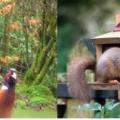
Can anyone find the Douglas fir in our grounds? Is that a male or female duck? What do red squirrels like to eat?
These are some of the questions that Class 2 (Years 3 and 4) from Arkholme Primary School (Lancashire) enthusiastically answered during their one night Habitats-themed residential at the hostel.
On the first day the group of 20 children went to Whinlatter Forest for a session with Phil and Barbara from Classrooms in the Forest, focusing on coniferous forest habitats. Then, on the second day, Phil and Barbara came to the hostel to lead activities in our grounds, focusing on trees and birds. A good array of wildlife performed for us, including a red squirrel, ducks, a red spotted woodpecker, great tits, blue tits, a nuthatch, robins, chaffinches, and a very large pheasant! Together we compared Whinlatter Forest and the Borrowdale mixed woodland, including the semi-ancient natural deciduous woodland in our grounds. We also made badges and postcards, on the Habitats theme of course!
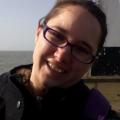
In February and March we were really fortunate to have the company of Mariana Ledi, a German student who supplements her teacher training studies with work in a hotel. One of her first shifts with us was a formal mess dinner for 60 Merchant Navy Cadets and we definitely benefited from her table-service expertise! It was very interesting to hear about her training, and the differences between our hostel and the hotel, so here is Mariana in her own words:
'In Germany I study English and Food/Nutrition Science to become a teacher at a vocational school. The course requires that we spend 90 days in an English speaking country and so I decided to spend 5 weeks at Derwentwater Independent Hostel, to have an insight into life and work at a hostel in Great Britain.
There are a few differences between the hostel and my work at a hotel in Germany. The life in the hostel is more personal, both concerning the relationship between staff and guests, and among the staff themselves, and the interesting communication at the hostel really helped to improve my English.
The colleagues in the hostel are really nice and welcoming. You can recognise them by their blue or green polo shirts, whereas in the 4.5 star hotel in Germany I have to wear a whole traditional uniform (tights, skirt, dress shirt, vest, half apron, and bow tie).
The hotel in Germany was built in the early 1930s and is very traditional, with two big halls for different occasions, for example weddings and balls for up to 300 people. I know the hotel very well, having been an apprentice there for 3 years.
So, what does my typical day in the German hotel look like? My work day starts at 5pm with a short meeting where I get the most important facts on the event. Then we check our tables and prepare other things such as food and drink for entertainers. When we have big events I have to care for usually four tables with 8 people on each table, and I will look after my guests for the evening, until they leave at about 1am.
To everyone at the hostel: thank you so much for everything I could learn and experience in the last five weeks. You made me feel very welcome, almost like a part of a big family, or, since I love food and sweets, I feel like a piece of a whole great cake. Thank you for helping me with my English, answering my questions and being patient. Yours, Mariana.’
Thank you for the chocolates, card, hard work and wonderful company Mariana! We’re sure you will be successful in your studies and become an excellent teacher: we certainly learnt a lot!
